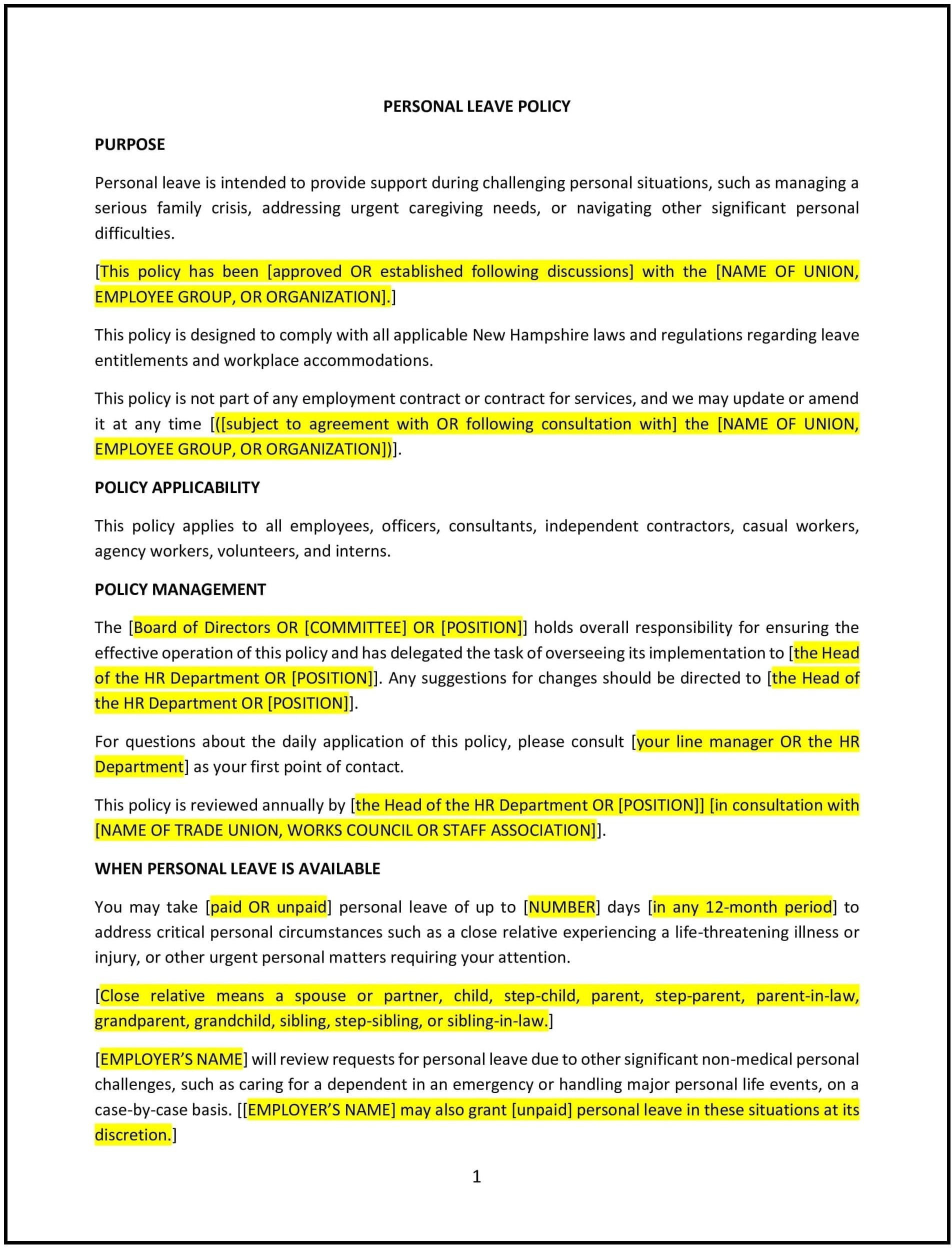Personal leave policy (New Hampshire): Free template
Got contracts to review? While you're here for policies, let Cobrief make contract review effortless—start your free review now.

Customize this template for free
Personal leave policy (New Hampshire)
A personal leave policy helps New Hampshire businesses provide employees with the opportunity to take time off for personal reasons, such as personal illness, family matters, or other situations that require absence from work. This policy outlines the process for requesting personal leave, eligibility requirements, the duration of leave, and any benefits provided during the leave period.
By implementing this policy, businesses can support their employees in balancing personal responsibilities while maintaining a productive and efficient workforce.
How to use this personal leave policy (New Hampshire)
- Define eligibility: Specify which employees are eligible for personal leave, considering factors such as length of employment and full-time status.
- Set leave duration: Clearly define the amount of personal leave employees are entitled to, including whether it is paid or unpaid. Indicate any limitations or maximum duration for personal leave requests.
- Outline the approval process: Establish a formal process for requesting personal leave, including advance notice requirements and documentation that may be needed (e.g., medical certificates, personal statements).
- Address pay during leave: Specify whether personal leave is paid or unpaid, and explain any benefits that continue during leave (e.g., health insurance, paid time off accrual).
- Define job protection: Ensure employees understand whether their position will be held for them upon their return from leave, or whether alternative arrangements may be made.
- Provide for emergencies: If the policy covers emergency personal leave, outline the procedure for taking leave in situations that require immediate attention, such as urgent family matters or medical emergencies.
- Establish return-to-work expectations: Specify the steps for employees to take when returning to work, including any required documentation or notice, and any adjustments or accommodations that might be needed.
- Review and update: Regularly review and update the policy to reflect changes in legal requirements, business practices, or employee needs.
Benefits of using this personal leave policy (New Hampshire)
This policy provides several benefits for New Hampshire businesses:
- Promotes work-life balance: By offering personal leave, businesses help employees balance their personal responsibilities, reducing stress and improving overall well-being.
- Increases employee satisfaction: Providing employees with time off for personal reasons can enhance job satisfaction and help improve retention by demonstrating that the company cares about their needs.
- Reduces absenteeism: A clear personal leave policy can help reduce unplanned absences, as employees are more likely to follow the established procedure for taking leave and communicate their needs in advance.
- Maintains productivity: When employees are given time off for personal reasons, they are more likely to return to work refreshed and focused, improving overall productivity and performance.
- Supports legal compliance: A well-defined personal leave policy ensures the business complies with applicable state and federal laws, including family and medical leave laws where applicable.
Tips for using this personal leave policy (New Hampshire)
- Communicate the policy clearly: Make sure all employees are aware of the personal leave policy, including how to request leave, how much leave they are entitled to, and what documentation is required.
- Be flexible: When possible, offer flexibility for employees needing personal leave, especially in emergency situations, to promote goodwill and maintain employee satisfaction.
- Review requests promptly: Respond to leave requests in a timely manner, ensuring that employees understand whether their leave has been approved and any impact it may have on their work schedule.
- Track leave usage: Keep accurate records of personal leave taken by each employee to ensure consistency and compliance with the policy.
- Address re-entry to work: Be sure to clearly communicate any return-to-work expectations to employees after their leave, including any necessary documentation or adjustments.